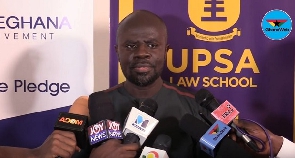 Dean of the Law School of UPSA, Prof. Ernest Kofi Abotsi
Dean of the Law School of UPSA, Prof. Ernest Kofi Abotsi
Dean of the Law School of the University of Professional Studies, Accra (UPSA), Prof. Ernest Kofi Abotsi, has attributed the exploitation of the country’s natural resources to the failure by Parliament to check the Executive in the granting of exploitation right.
Delivering a presentation on the theme “Development and Constitutionalism: Building a trusteeship that works and benefits citizens” in Accra on Tuesday, Prof. Abotsi indicated that Chapter 21, Article 268 required parliamentary approval of all transactions involving the grant of minerals exploitation right.
The intention of such provision by the 1992 Constitution, Prof. Abotsi opined, was to enhance constitutional trusteeship which is predicated on the idea that the power of constitutional governance sprung from the people over whom the power is exercised.
However, he explained that such intention had not been met due to issues such as winner takes all approach embedded in the country’s political system which leads to corruption and poor negotiating systems.
“The winner takes all approach have proved impossible to deal with where the winning party see themselves as rightful beneficiaries of not only power but trapping of authority and access to state resources,” Prof. Abotsi said.
Similarly, Prof. Abotsi bemoaned the poor performance of government agencies such as the Lands Commission, Fisheries Commission and Forestry Commission in whose hands the regulation of natural resources were entrusted due to agency capture by individuals and groups.
“The issue of agency capture has equally impacted the oversight of parliament. In fact, the problem may even be worse in the case of the legislative body given the very nature of the organ, its representative mandate and ostensible legitimacy of parliamentary lobbies,” Prof. Abotsi said.
Despite the manifold legislative interventions to address issues of exploitation of natural resources, Prof. Abotsi said there was a need for constitutional reforms to be established, especially, in the wake of the discovery of oil in the country.
He therefore made some recommendations to ensure that constitutional trusteeship was enhanced including the streamlining of government’s role as the watchdog over the use of the country’s natural resources and making parliament an approving entity rather than a ratification chamber.
Making parliament an approving entity, Prof. Abotsi said stood in spite of Article 181 of the 1992 Constitution which required that no deal entered into by the Government of Ghana (GoG) shall be entered into without parliamentary approval.
“The requirement of a simple majority approval such as contained under Article 181 and 268 is apt to lead to fragmentation of behaviour on the part of parliament,” he said.
“The record accordingly shows that the requirement of simple majority has been easily scalable and has resulted in the approval of obnoxious policies and questionable deals in the past. Enhancing this requirement to a higher threshold two-thirds majority approval would lead to higher scrutiny of projects as the need for votes across political lines will necessarily compel greater audit of deals presented,” Prof. Abotsi added.